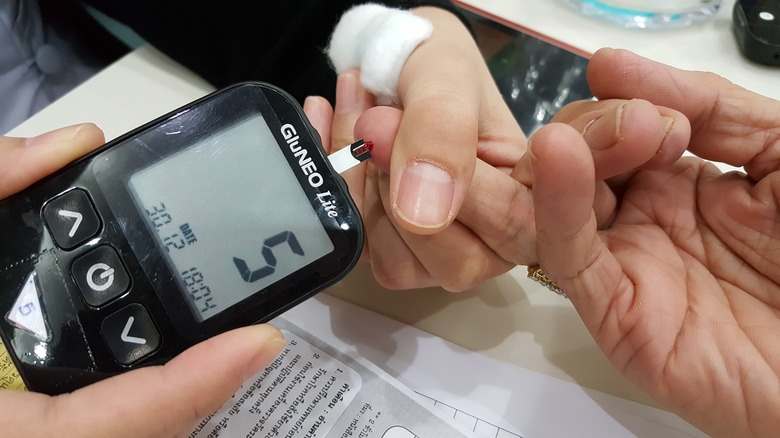What Does It Feel Like When Your Blood Sugar Is High?
If you're peeing a lot, constantly feeling tired, or have blurred vision, there's a high chance you have high blood sugar, also known as hyperglycemia (via National Health Services (NHS)). Hyperglycemia occurs when your blood sugar levels are constantly too high and might indicate diabetes, which can lead to further complications. If the blood sugar is too high for several weeks, it might indicate a preliminary stage of diabetes.
Although the symptoms aren't always recognizable, it's still a good idea to keep an eye on your blood sugar levels. Diabetes-related complications (as in the case of type 2) often develop slowly over time, per Medline Plus. Above all, people with these risk factors should also have their glucose levels checked by their doctor as part of a regular health check. Mayo Clinic notes that the blood sugar level in the blood on an empty stomach, i.e., without eating anything the night before, should be below 100 milligrams per deciliter (mg/dl) or below 5.6 millimoles per liter (mmol/l). After eating, this glucose level should not rise above 140 mg/dl (7.8 mmol/l).
Signs you might have high blood sugar
There are various symptoms associated with hyperglycemia, but they usually don't show until the glucose level exceeds 180 to 200 milligrams per deciliter (mg/dL), per Mayo Clinic. The longer your blood glucose level stays this high, the more serious symptoms can become. Some of the early symptoms to look out for include excessive thirst and frequent urination, which are the most common clues of diabetes, says WebMD.
These symptoms have their natural causes. For instance, Healthline states that excessive thirst or polydipsia can happen when you're sweating too much or not drinking enough water. According to Healthline, high blood sugar levels overwork your kidneys in trying to get rid of extra sugars. As a result, your kidneys have to pass out more during using up more water in your body, making you feel thirsty. On top of this, the American Academy of Dermatology Association says high blood sugar can dry up your skin, causing it to itch and exposing it to various skin infections.
Another common symptom of high blood sugar is fatigue. Healthline reiterates that a rise in blood glucose levels can make you feel sluggish and lethargic.
When to see a doctor
Sometimes, blood sugar can rise very suddenly. A sudden rise in blood sugar is particularly problematic in patients who already have diabetes and need to inject insulin. If the body starts running out of insulin, this is known as diabetic ketoacidosis, per NHS. With this condition, the body produces too little insulin, and fats are broken down into ketones. A build-up of ketones can be dangerous and life-threatening.
The causes of diabetic ketoacidosis are various. According to Mayo Clinic, if your body's insulin isn't working properly, this can trigger diabetic ketoacidosis. Other possible causes include a severe infection like pneumonia, an inflammatory disease, binge drinking, drugs, and not following your prescribed treatment routine, per NHS. Generally speaking, the symptoms of diabetic ketoacidosis develop quickly and within 24 hours. If you experience frequent urination, shortness of breath, excessive thirst, or weakness, please contact emergency services immediately.



